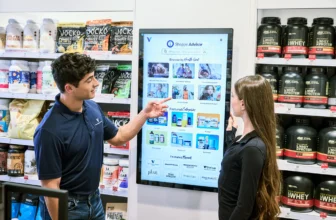This week, fintech firms get saucy with improvements, whereas retailers struggle again in opposition to bank card charges
This story is a part of “The Stack,” a weekly column that takes a deep dive into the methods tech firms are shaping the way forward for health and wellness
You realize the drill: The lease is signed in your next gym franchise and every part is in place. Trying to avoid wasting cash, you flip to on-line marketplaces to buy tools from an abroad vendor. However whenever you try, it’s a nightmare.
And it isn’t simply attributable to tariffs. Cross-border transactions are difficult and expensive, and are sometimes the rationale retailers and types, in addition to distributors, battle to increase their enterprise abroad.
Effectively, PayPal has you coated.
“Companies around the globe lose billions yearly in cross border charges whereas navigating a fancy banking system to make and settle for funds,” the corporate stated, including that it’s “simplifying cross-border commerce for retailers by connecting an unmatched mixture of cryptocurrencies, digital wallets, and retailers worldwide, whereas concurrently lowering transaction charges by as much as 90 %.”
“Pay with Crypto,” which is powered by PayPal, was constructed to attach retailers to a $3-plus trillion market “by enabling prompt crypto to stablecoin or fiat conversion.”
Below the hood, it requires the most recent tech working on the velocity of sunshine. For retailers and types, the method is easy and is designed to help transactions “throughout 100-plus cryptocurrencies and wallets akin to Coinbase and MetaMask,” PayPal stated, noting that the answer “expands service provider income alternatives and faucets into a world base of greater than 650 million crypto customers.”
Alex Chriss, president and CEO of PayPal, stated in a press release that companies of all sizes “face unimaginable strain when rising globally, from elevated prices for accepting worldwide funds to complicated integrations. At present, we’re eradicating these obstacles and serving to each enterprise of each dimension obtain their objectives.”
The CEO additionally stated the corporate lately launched PayPal World, “our international partnership bringing collectively 5 of the world’s largest digital wallets on a single platform, essentially reimagining how cash strikes around the globe. By enabling seamless cross-border crypto funds, we’re breaking long-standing obstacles in international commerce.”
“These improvements don’t simply simplify funds — they drive service provider progress, increase client alternative, and cut back prices,” Chriss stated. “That is the way forward for inclusive, borderless commerce, and we’re proud to guide it.”
New Cost Pathways From Mastercard
Mastercard stated it’s modernizing provider reconciliation and streamlining digital card funds with a number of new improvements.
The bank card big is rolling out widescale international availability of Mastercard Receivables Supervisor, the corporate’s “automated resolution that makes digital playing cards extra environment friendly, safe and cost-effective for companies to simply accept,” Mastercard stated in a press release including that to offer cost service suppliers higher flexibility in how they provide B2B cost improvements, “Mastercard can also be introducing Business Direct Funds, a complicated straight-through processing resolution that totally automates digital card funds and reconciliation.”
Coupled collectively, the corporate stated it now delivers “a quick, revolutionary B2B cost expertise for each patrons and suppliers at an opportune time when embracing the digitization of business funds is more and more transferring from non-compulsory to important.”
Citing its personal analysis, Mastercard stated 93 % of B2B suppliers stated digitizing cost processes is a high precedence for his or her enterprise, “whereas two-thirds nonetheless acknowledge repeatedly falling wanting purchaser cost expectations.”
“Companies at present count on easy, safe, and seamless methods to pay and receives a commission — with many turning to digital playing cards to satisfy these expectations,” stated Marc Pettican, international head of company options at Mastercard. “To help our shoppers wherever they’re on their modernization journey, we’re thrilled to carry to market one other easy path to receivables automation, and to gasoline the consumerization of B2B funds around the globe within the course of.”
Mastercard Receivables Supervisor, launched simply two years in the past, has developed with new options akin to multi-language help and safe card-on-file performance to drive international digital commerce. The corporate stated buying companions worldwide are embracing this innovation to modernize provider digital card acceptance and strengthen buyer-supplier relationships.
Within the U.S., suppliers akin to Elavon and Run Funds supply the answer to deal with guide processing hurdles, which 42 % of suppliers spotlight as key obstacles to adoption. In the meantime, EazyPay in Bahrain leads adoption within the Center East, reworking accounts receivable workflows.
The following wave of B2B cost innovation, Business Direct Funds, redefines accounts receivable automation by enabling direct card cost processing between patrons and suppliers. This eliminates guide steps, deposits funds mechanically, and integrates detailed remittance information into AR workflows for seamless effectivity.
Retailers Flip Up Warmth In opposition to Credit score Card Corporations
Retailers throughout varied segments are getting more and more cranky over bank card charges, and a coalition they fashioned again in 2011 is pushing for passage of the Credit score Card Competitors Act (CCCA). The group additionally factors to a brand new survey that reveals two-thirds of shoppers favor decrease swipe charges and stated they consider the CCCA would assist cut back these charges.
The Merchants Payments Coalition (MPC) stated it represents retailers, supermarkets, comfort shops, gasoline stations, on-line retailers, resorts and others who’re “combating for a extra aggressive and clear card system that’s honest to shoppers and retailers.”
The MPC survey confirmed that 71 % of respondents stated decrease bank card swipe charges “can be ‘a superb factor,’” in contrast with solely 16 % who disagreed. The survey discovered that twice as many individuals (48 %) consider “‘extra competitors within the bank card market’ would lower swipe charges for retailers and shoppers alike than consider the alternative (24 %),” the MPC stated in a press release.
The web survey of 1,012 U.S. adults was achieved between July 21 and 23 by polling agency Massive Village.
For inquiries and suggestions associated to “The Stack,” please attain out to [email protected]






